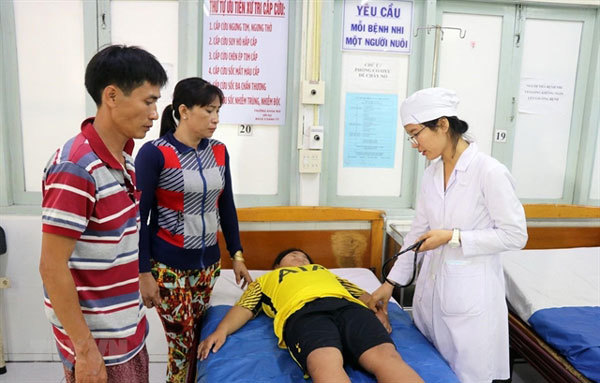Hospitals need to improve canteen services
Group of policemen offer free meals to poor patients
 |
| HCM City has asked hospitals to encourage each patient to be accompanied by one family member in order to reduce overcrowding and ensure order and security. —VNA/VNS Photo |
The move was made following reports that some hospitals in the city were charging patients’ families for using basic services such as toilets, water and chairs.
Earlier this month, a hospital in the city’s Thu Duc District announced it would charge patients’ families VND30,000 (US$1.3) per person per day for using such services.
The hospital’s managers said the fee would be used to invest in improving health check-ups and treatment quality for patients.
Director of Tu Du Hospital Le Quang Thanh told Việt Nam News that some hospitals charged patients’ families with the aim of ensuring social order and security at hospitals.
“The fee collection is considered part of management measures to limit the number of patients’ families staying at the hospitals, ensure order and security and ensure the best treatment for patients,” he said.
Many criminals pretended to be related to patients to enter hospitals and it was common for patients and their families to have cell phones and money stolen, he added.
He noted that the fee was small so the fee collection was not aimed at increasing hospitals’ incomes.
However, director of the municipal health department Tang Chi Thuong said it was unreasonable to charge patients’ families for such basic services.
The department ordered the hospital in Thu Duc District to stop the collection of such fees.
He said the cost for services such as rest rooms, water, lifts, electrical outlets and other services were included in check-up and treatment services so hospitals were not allowed to collect extra fees.
Hospitals should provide a wide range of services for patients and their families, depending on each hospital’s ability, he said. They could provide extra services with fees such as food, laundry services and beds to meet the demands of certain patients and families. The price of these services must be publicised.
It was also necessary for hospitals to increase information dissemination to raise awareness among patients and their families of abiding by regulations, particularly in keeping order and security and ensuring that each patient is accompanied by one family member, he said.
The department also encouraged hospitals to build accommodation for patients and their families travelling from outside of the city.
Hospitals in big cities like Hanoi and HCM City are in dire need of more accommodation for hospital patients and their relatives. Each hospital receives thousands of patients from other provinces and cities every day.
Each patient often has one or several family members accompanying them. It’s common to see patients’ relatives resting in corridors, under stairs, on benches or under trees on hospital premises as they can’t afford to rent accommodation.
Hospital K in Hanoi, which provides treatment for cancer patients, for example, put into operation a residential complex for patients and their families. The accommodation was offered for free at first and later, the patients only have to pay VND15,000 per person each day for electricity and water, much cheaper than renting houses in areas around the hospital.
Regarding toilets, the health department required hospitals in the city to have plans to upgrade toilets in 2019 to ensure better sanitation conditions for patients and their families, following instructions from the Ministry of Health, according to Thuong.
VNS
 The HCM City Department of Health has asked hospitals to not charge patients’ families for basic services.
The HCM City Department of Health has asked hospitals to not charge patients’ families for basic services.